- Home
- Rick R. Reed
The Man From Milwaukee Page 2
The Man From Milwaukee Read online
Page 2
She grabbed that same hand and squeezed it. “I know who you are! You can’t fool me. You're the one’s been tryin’ to steal my dreams. Yes! Just in here last night, trying to lift my dreams from my head!” Mother's stare was accusing, her eyes moist. “You just go on, go on and get out of here, you filthy pervert, before I call the cops.”
Mother began to cry as Emory turned her gently on her side so he could slide the soiled bedding out from underneath her.
*
Later, Emory, alone in his room, turned his portable TV on. The ten o'clock news would be on in a few minutes, and Emory wanted to see what they had to say about Dahmer. While he waited, he pulled that day’s newspaper from his desk, rereading the front-page story.
The picture of Dahmer drew his eyes away from the type. How could he have done it? What must have driven him? Why would he want to do such horrible things?
As he pondered these questions, a memory, completely unbidden, came to him, rising up like Technicolor pornography. No matter how hard Emory tried to concentrate on the newspaper or even the boys’ voices outside his window, it kept coming back, almost as if it had a life of its own, telling Emory: I will not be denied.
Earlier that summer, another hot night, very much like this one, when the moisture in the air wed the heat and the two became an unstoppable force, omniscient in delivering energy-sapping misery to the minions—those who could not afford air-conditioning.
Howard Street, a dangerous place, filled with shouts and come-ons from prostitutes. How did Emory's walk along the lakeshore bring him here? It was as though his feet had minds of their own.
A siren's call: the adult bookstore across the street beckoned. Its tawdry blinking lights and fluorescent signs in the windows promised X-rated delights for a mere quarter.
Emory had sworn to himself he would never return there. Ever. He had made his resolve strong. Steeled himself to never go inside that sick place, where the worst diseases, ones dealing death, were freely exchanged in the dark shadows of filthy peep-show booths, the floors littered with dirt, cigarette ash, and discarded condoms. He had told himself that he would be a healthier person if he never went inside such a place again. Such places were beneath him.
Yet, he waited for a break in the traffic and dashed across the street. A hot wind blew his ash-blond hair off his forehead. Everyone was staring at him, and they all knew what was on his mind.
The door’s metal handle was cool, and Emory, heart pounding, sweat oozing out of his pores, and his resolve shaken but not gone—I'll go in, but just to see what it's like—yanked the door open.
After giving the man behind the counter two dollars in exchange for a handful of tokens, Emory went to the back part of the store where the video booths were. A line of flashing lights lined the ceiling, doing little to combat the darkness, settled upon the room like fog. A few men, hands thrust in pockets or smoking cigarettes, milled about, pretending to read descriptions of the pornographic movies they might select in the booths, but Emory could see their quick glances at him out of the corners of their eyes.
Emory's stomach rolled, and he tried to keep his eyes cast downward. All I’ll do is look at a movie and then leave. Emory ducked into the first booth he came to. Hands shaking and palms slick with sweat, he pumped several tokens into the box that would bring the video screen before him to life.
Feeling sick, but transfixed, Emory stared at the screen, where a young boy, sprawled across a table, was being fucked ruthlessly by an older man. His legs were thrown up, partially hiding the older man's hairy chest. The older man’s cock was huge, sliding in and out of the boy’s ass, and Emory wondered if the pain on the boy’s face and in his whimpers was real.
Emory ignored the tightening in his pants, biting his lower lip hard enough to bring stinging tears to his eyes.
The door behind him squeaked, and Emory’s spine stiffened at the warmth of someone else sliding into the booth. The shadow of the man fell across the wall. Emory didn’t turn but stood mute as strong hands slid around his waist, encircling it. Emory said nothing, as moist lips, like slugs, crept across the back of his neck. Said nothing as the stranger’s big fingers fumbled with the button and zipper of his jeans. Said nothing as he yanked Emory’s jeans to his knees. Said nothing as clothes rustled behind him. Said nothing as the heat of a penis pressed against the crack of his ass.
The man growled in his ear, and Emory braced his hands on the wall before him as the man slicked his cock with spit and pushed into Emory’s ass, not stopping until he broke through the ring of muscle.
Emory gasped, the pain sudden and intense—throbbing. White-hot needles.
Emory began to cry as the man thrust into him. He felt dizzy, nauseous, but gripped his knees anyway, bending over so that the man could enter him more deeply.
His own cock softened as the man’s thrusts grew more rapid, harder, as if suddenly what this man wanted to be was a messenger of pain rather than pleasure.
“Never again,” Emory whispered to himself over and over. “Never again.”
Emory’s head jerked up: the images of memory scattered at last, leaving him breathless and clawing his faded quilt. A pool of semen, viscous and warm, had pooled beneath him.
And in front of him, on the screen, was Jeffrey Dahmer, being led, handcuffed, into a courtroom. Dahmer wore the same blue-and-white striped shirt he wore in the newspaper’s photograph.
The face on the screen was terrified. Emory was sure of it. He was also sure that the terror was born of feeling out of control. He knew Dahmer, he thought, and understood him. He couldn’t help himself.
And at once, Emory felt he had a unique understanding of the killer. Empathy was probably a more apt word.
Tomorrow, he would find out the name of the prison where Dahmer was confined and Emory would write him and let him know there was at least one person who appreciated what he was going through, without judgment. Understood, really, that none of this was Dahmer's fault.
Chapter Two
Sunlight filtered in to Emory’s room, and he groaned, pulling the pillow over his head. He preferred winter, when daylight came later in the morning and departed earlier in the afternoon. Darkness had always been a friend to him.
Because it was only six a.m., he had another hour in which he could sleep, but even snuggled down into the body-warmed bedding, he found that slumber elusive.
Sighing, he sat up and looked around the room. Across from his bed (maple headboard he’d had since he was a little boy) was his desk, also a relic from boyhood days, and on it, the Trib from yesterday with Jeffrey Dahmer’s photo on the front.
He got up and glanced down at the grainy photo and next to it, the spiral-bound notebook he’d set out the night before to write to him. There was something in that face that kept drawing Emory back, and it chilled him that he was so inclined. But in those bland, blond features, something called out to Emory—a plea for understanding, maybe, or simply a need to connect with another human being.
Another human being like him?
He shivered. Emory pulled on a T-shirt, and in it, along with his plaid boxers, he came out of his room into the rest of the apartment.
It was quiet, save for the rumble of the L a couple of blocks over. The door to Mary Helen’s room was shut, and he knew better than to knock, or worse, open that door. She probably wasn’t even in there, anyway. Who knew where she went at night?
He stopped outside Mother’s door, listening. All was still, so he turned the knob slowly and then opened the door quickly, hoping it wouldn’t creak. The door complied, staying mute. Emory slipped inside her room and paused beside her bed. Mother’s head stuck out from a mound of blankets, and for a moment, Emory could almost forget her sickness, her nearness to death. She slept and the slackness of her features lent her an innocence. There was even a little color in her wan cheeks, probably a result of how warm she must be in this sweatbox of a room, buried under blankets, fever stoked. There was a sour smell in the air tha
t turned Emory’s stomach, especially this early in the morning. He knew there’d be breakfast to make, even though she’d barely touch it, and cleaning up to do.
But, for now, she slept, and Emory knew that meant he’d have a few minutes, maybe even a half hour, to selfishly tend to himself. He closed his eyes and let a little sigh of relief escape his lips.
Back in his own room, he sat at his desk, picked up a Bic pen with the tip chewed, leaving it marred and coarse to the touch. He closed his eyes for a moment, the pen poised above the lined paper.
And then he began to write.
The words flowed out of him without thought, as though he’d composed what he said as he slept. And maybe he had because he could vaguely recall an image of Dahmer, standing over him as he slept, softly mouthing words he couldn’t quite hear or understand. He might have even been singing.
*
Dear Mr. Dahmer,
You don’t know me, although our paths might have crossed one night on one of your visits to Chicago. But I doubt that. I’m sure I’d remember if you and I had ever been in the same room.
I wanted to take a moment and write to let you know there’s one person out here who understands what you’re going through. I fight my own demons, day after day, and know that sometimes our best intentions get crushed under the weight of needs we have no way of understanding, let alone escaping, try as we might to be good.
I know.
I know what a horrible thing it can be to be compelled to do things you know are wrong, evil, but for whatever reason, you’re built to be unable to resist these needs. I have them. To some degree, I suspect we all do. Yours are much worse than the average person, yes, but that doesn’t mean you wanted to feel the things you felt. Things that drove you to do what the papers say you did…
Anyway, if you get this letter, I’d love to hear back from you. I know right now the whole country hates you and gazes at your face with horror. But I don’t. I see a young man like myself, confused and full of pain because he can’t help being who he is.
We’re both twisted. In different ways, but I do know what you’re going through right now, believe it or not. I see you sitting in a cell, maybe relieved now that your hands have been tied, so to speak.
You can be good now.
I envy that, just a little bit.
I wish I could be good. I’ll keep trying, but it seems like the harder I battle the demons inside, the more they persist.
Anyway, if you get this (I don’t know how mail to prisoners works—I’ve never written to anyone in jail before), please take the time to consider me a friend you can talk to.
I’ll be anxiously awaiting your response.
Very truly yours,
Emory Hughes
*
Emory let the pen drop to the notepad so he could rub his eyes. Suddenly, they burned as they did when he stayed up too late, his body starved for sleep. He groped around in the top left-hand drawer and brought out an envelope. He folded the letter and stuck it inside. When he licked the glue, he imagined he was kissing Dahmer and then forced the thought away, as if it were something foreign and not the product of his own lustful mind.
He addressed it:
Mr. Jeffrey Dahmer
Prison System
Wisconsin
USA
He hoped that would be good enough—after all, there was no more notorious killer in the country right now.
And then he picked up the pen again.
His fingers just about flew over the notebook paper of their own accord. The words, just right, continued to flow from Emory, using only instinct and no thought.
For the first time since he could remember, he smiled.
Chapter Three
Tyler Kay awoke, rolled over, and grabbed his tortoiseshell-framed glasses from the nightstand next to his twin bed. He lay awake, quiet, for a few moments, listening to the sounds of the world as it awakened. Birds chirped outside his window, which he insisted on keeping open in the summer, despite his parents’ house having central air-conditioning. If his father ever caught him, he’d have a fit and accuse Tyler of trying to air-condition the “whole goddamn great outdoors.” Downstairs, he could hear the kitchen radio, tuned to NPR, on the local public radio station and the murmur of his parents’ voices in the breakfast nook.
His world was located in Wilmette, Illinois, on the same street he’d grown up on—Tenth, just north of Lake Avenue. His world was one of affluence, bright sunshine, a one-hundred-and-something-year-old white Dutch Colonial house with a gazebo in the backyard. His world encompassed an attorney father, a stay-at-home mother, two sisters, one two years older, and one five years younger. Both were still in school, the older at Northwestern in their MBA program and the younger still in high school at New Trier. He moved in an atmosphere of country clubs and weekends in Wisconsin at the family summer home—a coach house in Fontana, on the shores of Lake Geneva.
Tyler had just graduated from DePaul University in downtown Chicago with a Bachelor of Arts in English. Much to his dad’s chagrin, Tyler longed to be a serious author one day, someone like Updike or Roth or Capote or Mailer—someone the world would hold in high esteem, a reliable mirror for our lives and our passions. His creative writing classes prompted him to write literary fiction, the kind of stuff he submitted to the Atlantic Monthly or the New Yorker, despite never having received so much as a form rejection from either publication. In the desk drawer opposite his bed were the pages of a half-written novel, inspired by Proust’s Swann’s Way.
And here it was—his first day at his first job out of college. Was he an editor at a newspaper or literary magazine? A book critic for the Tribune or Sun Times or even the Reader? Maybe he’d landed a job as an editor at Encyclopedia Britannica downtown? Surely, Tyler would have found something that made use of his English degree. At least, that was what his father supposed.
But no, Tyler found most doors closed to him for entry-level editing or writing jobs. The world was a competitive place for English majors, especially those who’d spent four years taking classes mainly in poetry, creative writing, and French literature.
So when Quality Investigations on north LaSalle Avenue offered him an entry-level job as an insurance investigator, Tyler jumped at the chance, even though he knew it would make little use of his degree (save for writing up underwriting reports on folks applying for large life insurance policies—but the wording of these was so proscribed that Tyler’s English degree and writing aspirations hardly mattered). His father would at least be happy he’d found something with a degree that had been both an object of ridicule and disappointment for Dad ever since Tyler declared it in his freshman year.
Tyler swung his legs over the edge of his bed. He told himself he could work on his novel and short stories in the evenings. And he could always keep his eyes open for another job, something more suited to his creative and literary abilities.
He had to admit—he was a little excited about the prospect of his first day at work at a real job, no matter how boring and routine it might prove to be. Who knew whom he might end up working alongside? And the prospect of being a morning and afternoon commuter on the Metra train excited him—he could visualize himself in one of the green leatherette seats, wearing his crisp white shirt, rep stripe bowtie, and navy slacks, reading James Joyce as the suburban and urban landscapes blurred by his window.
Save for clerical work at his father’s intellectual property law firm, Tyler had never worked full time before and the mystery of what awaited him in the real world was making him a little giddy with anticipation.
Who knew what might be out there waiting for him? Perhaps a new friend?
Maybe even a lover?
Tyler pushed away the sheet covering his hairless white frame and leapt from his bed.
Today would be a good day, a turning point.
*
Tyler paced outside the LaSalle Avenue high-rise that housed Quality Investigations on the building’s thirty-
second floor. He took off his glasses and gave them one more polish with the bottom of his shirt and then tucked the shirt back into his pants. He watched other workers, just like himself, hurrying both north and south on the crowded sidewalk.
The day had started off hot and humid and had only gotten more so as Tyler rode the train into downtown. Now, the air felt like a moistened blanket hanging over him, weighing him down. Despite the discomfort, he was suddenly nervous about heading inside to the little windowless cubicle he’d surely be assigned. His stomach churned at the prospect—exciting earlier—of all the new people he’d meet today and churned even more as he thought of having to make all the phone calls his new position would entail.
What had he been thinking? He could never do this job! He was the kind of guy who worked in isolation. The idea of having to talk to people all day made him break out in a cold sweat, in spite of the fact that the temperature was already in the upper eighties.
Buck up, old man, he told himself, adopting a plummy internal British accent. Get yourself in there. Rise to the occasion. Chin up. Forward!
*
“Tyler, I’d like to introduce you to Emory Hughes. He’s been with us for more than five years. He does the same work you’ll be doing, so I’ve assigned him to be your mentor for your first couple of weeks. He’s here to answer any questions you might have about the work and to show you around the office, get you comfortable. Okay?” His supervisor, Jennifer Vidovic, beamed at him as though she were delivering a million-dollar bonus check rather than some coworker who most likely wanted to be anywhere but here.
Tyler looked up from his desk, where he’d been reading Quality Investigation’s New Employee Handbook, to regard a mouse.
No, really, the guy reminded him of a mouse. There was something rodent-like in his looks—dun-colored hair, in need of a good cut, and the way his two front teeth were slightly longer than the others—Tyler expected the guy’s nose to twitch. Yet, there was something bright in his pale-blue eyes that drew Tyler in. He was tall, too, which Tyler liked. His mother would say that he was “skinny as a beanpole,” but Tyler liked that too. He favored tall, skinny guys and had found them to be reliably well-hung.

 Big Love
Big Love Blue Umbrella Sky
Blue Umbrella Sky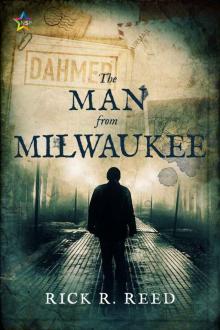 The Man From Milwaukee
The Man From Milwaukee Unraveling
Unraveling Penance
Penance Husband Hunters
Husband Hunters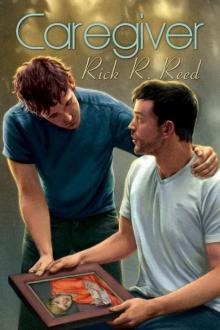 Caregiver
Caregiver Superstar
Superstar Beau and the Beast
Beau and the Beast Obsessed
Obsessed Bigger Love
Bigger Love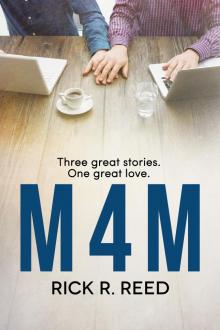 M4M
M4M I Heart Boston Terriers
I Heart Boston Terriers Dinner at Jack's
Dinner at Jack's A Dangerous Game
A Dangerous Game An Open Window
An Open Window Dinner at Fiorello’s
Dinner at Fiorello’s The Perils of Intimacy
The Perils of Intimacy Orientation
Orientation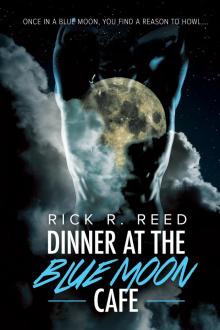 Dinner at the Blue Moon Cafe
Dinner at the Blue Moon Cafe High Risk
High Risk Sky Full of Mysteries
Sky Full of Mysteries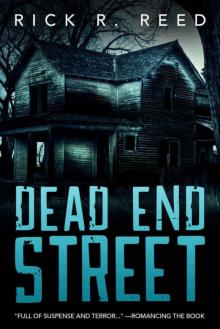 Dead End Street
Dead End Street Crime Scene
Crime Scene Fugue
Fugue Blink
Blink Lost and Found
Lost and Found